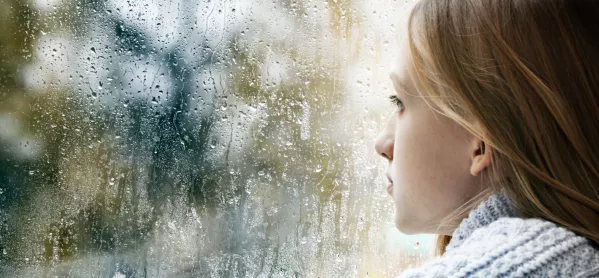- Home
- My CPD priority? Forget pedagogy, it’s mental health
My CPD priority? Forget pedagogy, it’s mental health

New Year’s Eve seems like it happened about a decade ago. As we gawped at the telly, the sky above the Thames popping with coloured lights, my civically-pragmatic son did his annual waste-of-money rant, speculating about how many NHS staff could be paid with the cost of fireworks.
As usual, I told my lad to shut his moaning gob and get in the spirit of it. This exchange is a heartwarming family tradition, but through the lens of what’s happening now, his carping has a Cassanda-like ring to it.
Current events have unfurled with such speed, it’d seem unwise to assume anything solid about the return to work. It depends on the virus, doesn’t it? What’s safe to say, is that we’ve all been through something, a time which could prompt fundamental change as individuals and as a world.
News: Unions set out 5 safety tests
More: Being a leader in crisis is tough - we must take care
Opinion: How #JoyFE has been a source of connection for many
Dependent on personal circumstances, the experience of lockdown has been on a spectrum from casual disruption to extreme trauma. Having been stuffed to the chops with mental health whoopsies since I was a kid, I feel like my everyday life pre-Covid was rehearsal for all of this shit. I can now re-edit those previous 46 years as a Rocky training montage - I’m not sure what the mental health equivalent of punching big lumps of meat on fridge hooks is, but anyway, that. In this big fight, I’m currently knocking seven bells out of my own Apollo Creed, clinical depression.
Admittedly factors like a loving family and a house with a garden give me an advantage. But lots of people’s existing mental and emotional health will have taken a battering in isolation. You only have to look at the increase in calls to suicide prevention charities to know that folk have really suffered.
Tackling mental health myths
The rhetoric around Covid-19 that I’ve found particularly damaging has to do with character. The idea that having a strong personality has a greater impact on whether the virus will get you, and if it does, whether it will kill you. Just look at how the prime minister’s dose of it was handled: so much talk about his zest for life, his optimism, his strength of character. As far as I understand, the virus doesn’t give two shits if you’ve a twinkle in your eye, or if you’re someone who rarely says boo to a goose. The virus isn’t worried what your personality is like. It’s biology, not Tinder.
This idea runs parallel with the outdated notion of mental ill-health being something that tough, strong, characters don’t have to worry about. Nah, mate. Booting this myth out of the conversation is especially important during a time that pushes vulnerabilities to the fore.
Experiencing a chocolate box selection of physical and mental responses to what is happening (from unpredictable sleep patterns and vivid dreams, to waves of panic) will be the first-ever brush with disrupted mental health for many people. That in itself can be traumatic, rattling the foundations of what they thought they knew about themselves.
What concerns me further, is the aftermath. We are in the middle of it now. Peddling like mad just to get through. What happens when we stop? Elation at the return to whatever normal is? Perhaps reluctance to re-engage with the world? Maybe even post-traumatic symptoms?
I wonder how many people, like me, have hefted the bigger thoughts to their brain’s cupboard under the stairs, to sort out later; the thoughts on how this time might forever change the way the world works and what our new place in that world is. How many people are equipped to cope with reflections of such magnitude?
Supporting students to cope with uncertainty
If we do return in September (or before…) to a college life that bears some resemblance to what it was before, how can we support students to cope with all these uncertainties, some of whom were pretty vulnerable to start off with?
I’ve always been really clear with students that I am not a mental health specialist or qualified to give any sort of medical advice. However, it’s my duty to try and support them in whatever way they need supporting. The college has access to a framework of people who are experts in those fields and I can help make sure they get to the right person.
So when we do move forward towards a version of the old life, my CPD priority won’t be pedagogical, it will be to learn more about mental health, how to spot the signs of someone who is really struggling, how to offer that initial path to the most appropriate means of support, how to provide help beyond my instinct to nurture.
In a world of unknown unknowns, my own learning is something that I can control.
Sarah Simons works in colleges and adult community education in the East Midlands and is the director of UKFEchat.
Keep reading for just £1 per month
You've reached your limit of free articles this month. Subscribe for £1 per month for three months and get:
- Unlimited access to all Tes magazine content
- Exclusive subscriber-only stories
- Award-winning email newsletters



